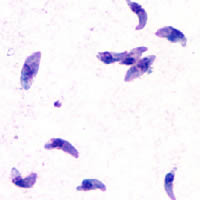 The common parasite Toxoplasmosa gondii is associated with an increased risk of a rare form of aggressive brain cancer called glioma, according to a recent study. Toxoplasmosis is a disease that results from infection with the microscopic Toxoplasma gondii parasite.
The common parasite Toxoplasmosa gondii is associated with an increased risk of a rare form of aggressive brain cancer called glioma, according to a recent study. Toxoplasmosis is a disease that results from infection with the microscopic Toxoplasma gondii parasite.
People can be exposed to this parasite from infected cat feces, drinking contaminated water, eating infected undercooked meat (especially pork, lamb, venison). Mother-to-child transmission during pregnancy can also occur. [CDC toxoplasmosis page] Most healthy people recover from toxoplasmosis without treatment, but it can be dangerous for certain groups (e.g. the fetus during pregnancy)

The study found that persons with gliomas are more likely to have antibodies to T. gondii (which means they've had a prior infection), than a similar group that was cancer free. The researchers thought the parasite can sometimes form cysts in the brain, and the inflammation associated with the cysts might be responsible.
The study looked at 2 groups of people, both in the US and in Norway. Another finding was that "some people with glioma have no T. gondii antibodies, and vice versa". (Whew...) The study showed an association, and does not prove cause and effect. However, other studies found similar results.
Gliomas make up the majority of malignant brain tumors, and glioblastomas (with a 5 year survival rate of 5%) are the most common type. Gliomas occur in approximately 6.6 per 100,000 individuals each year. In comparison, it is estimated that 11% of the US population to 60% in some areas of the world have been infected with the T. gondii parasite. And yet the brain cancer is very rare.
From Science Daily: Study identifies exposure to common food-borne pathogen linked to rare brain cancer
A new study suggests a link between toxoplasma gondii (T. gondii) infection and the risk of glioma, a type of brain cancer, in adults.
The report, appearing in the International Journal of Cancer, finds that people who have glioma are more likely to have antibodies to T. gondii (indicating that they have had a previous infection) than a similar group that was cancer free.
From Gizmodo: Scientists Find Link Between Cat Parasite and Brain Cancer in People
